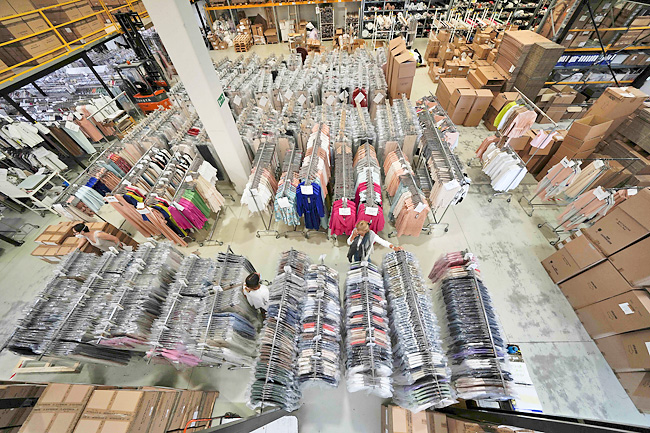BRESCIA, ITALY (AP) – Fine Italian knitwear packed in boxes addressed to retailers in Moscow, St Petersburg and Kursk sit stacked in a Lombardy warehouse awaiting dispatch.
Although not subject to sanctions to punish Russia for invading Ukraine, the garments are not likely to ship any time soon.
Missing payments from the Russian retailers who ordered the garments are piling up due to restrictions tied to the banking sector, putting pressure on small fashion producers like D Exterior, a high-end knitwear company with 50 workers in the northern city of Brescia.
“This is very painful. I have EUR2 million worth of merchandise in the warehouse, and if they cannot pay for it, I will be on my knees,” said D Exterior owner Nadia Zanola, surveying the warehouse for the brand she founded in 1997 from the knitwear company created by her parents in 1952. Italy is the largest producer of global luxury goods in the world, making 40 per cent of high-end apparel, footwear and accessories.
While Russia generates just about three per cent of Italian luxury’s EUR97 billion (USD101 billion) in annual revenue, it is a significant slice of business for some of the 80,000 small and medium companies that make up the backbone of Italian fashion, according to industry officials.
“We are talking about eliminating 80 per cent to 100 per cent of revenues for these companies,’’ said president of the Confartigianato fashion craftsman federation Fabio Pietrella.

Districts producing footwear in the Marche and Veneto regions, and knitwear makers in Umbria and Emilia-Romagna have grown particularly reliant on Russia. “These are districts that connect the supply chain, and if it is interrupted, not only is the company that closes harmed, but an entire system that helps make this country an economic powerhouse,’’ Pietrella said.
The Italian fashion world is best known for luxury houses like Gucci, Versace and Armani, which unveil their menswear collections in Milan this week.
And some of the biggest names appear on a list compiled by Yale University professor Jeffrey Sonnenfeld of major companies doing business in Russia since the war in Ukraine began.
He also underlined that fashion companies don’t have the grounds to make humanitarian appeals to bypass sanctions, voluntary or otherwise, as has been the case with agricultural firms and pharmaceutical companies.
Among those receiving a failing grade from Sonnenfeld is Italy’s Benetton, which in a statement condemned the war but said it would continue its commercial activities in Russia, including longstanding commercial and logistic partnerships and a network of stores that sustain 600 families.
French conglomerate LVMH, meanwhile, has temporarily closed 124 stores in Russia, while continuing to pay its 3,500 employees in Russia.
The Spanish group Inditex, which owns the fast-fashion chain Zara, also temporarily closed 502 stores in Russia as well as its online sales, accounting for 8.5 per cent of group pre-tax earnings.
Pietrella fears a sort of Russia-phobia is taking hold that is demonising business owners for trying to keep up ties with a longer-term vision.






